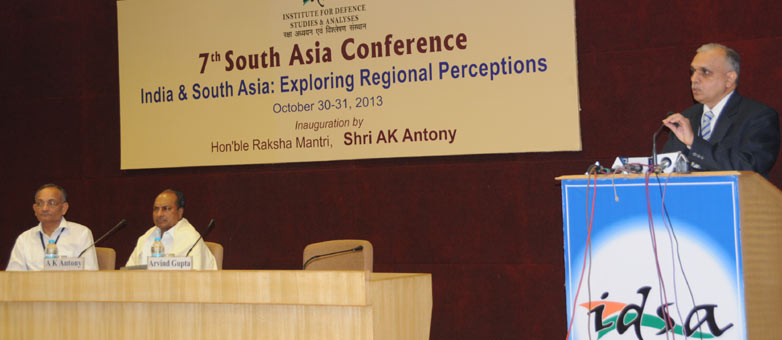You are here

Hon’ble Raksha Mantri
Delegates to the conference
Members of the Executive Council
Members of the Strategic Community
Members of the Media
IDSA Colleagues
Ladies and Gentlemen
Good Morning,
It gives me great pleasure to welcome you to the 7th South Asia Conference being organized by the IDSA on the theme of “INDIA AND SOUTH ASIA: EXPLORING REGIONAL PERCEPTIONS”.
I am most grateful to the Hon’ble Defence Minister for having agreed to inaugurate this conference. His invaluable support to this project over the last several years has resulted in institutionalizing the South Asia Conference as an annual event of the IDSA.
In the last seven years the conference has emerged as a platform for scholars and experts from India and SAARC countries for exchange of views on a variety of issues concerning South Asia.
The previous six conferences have discussed themes such as “Economic Cooperation for Security & Development in South Asia”, “Changing Political Context in India’s Neighbourhood and Prospects of Security and Regional Cooperation”, “South Asia 2020: Towards Cooperation or Conflict?”, “The Common Challenge of Terrorism in South Asia and Prospect of Regional Cooperation”, “Cooperative Security Framework for South Asia”, and “Prospects for Stability and Growth in South Asia”.
Despite the best efforts of the leaders, regional cooperation in South Asia remains at a level much below the desirable. The SAARC was established in 1985 and BIMSTEC in 1997. These are important regional organizations but the progress towards regional cooperation has been slow.
The present situation in the region is not comforting either. Democracy has set in but the democratic institutions remain weak. Terrorism continues to be a serious threat. The aspirations of the youth are growing. This will have serious consequences for stability in our countries. Radicalization of societies is happening at a disturbing pace. One can count several other disconcerting trends.
There are many reasons why South Asia has been lagging behind in the efforts towards regional cooperation. One of the reasons is the negative perceptions the countries of the region have about each other. Many countries of the region have had a turbulent past. Conflicts and wars have continued to shape negative perceptions about each other. Very often the discourse about India in the neighbouring countries is coloured by its pre-dominent size, colonial legacy, and historical baggage. These factors also come in the way of fostering a positive image about each other.
But, we should not overlook our strengths and positive stories from the region. This will help generate better perceptions about each other.
The region has not remained static. Democracy has taken hold in this part of the world. South Asian countries have also done relatively well economically. Our young people and the new generation are less affected by the negative past. Thanks to the ICT revolution and the onset of social media, we know each other better than before. The Indian economy has grown significantly in size since 1991 and is on course to become a global economy. The countries of the region are beginning to realize the sizable benefits they will acquire if their economies are linked with the Indian economy.
The region has tremendous soft power which can be harnessed for mutual benefit. All our countries have great civilizational past and can boast of cultural richness which is the envy of others. We have young and talented populations.
India is the largest country in the region. This conference will seek to explore various perceptions about India in each of the neighbouring South Asian countries. Which are the key forces that shape or perpetuate the prevailing perceptions? What is the role of the media? Why has the region failed to connect to India with its rising political and economic profile? We will also explore how best India can manage or improve the perceptions among its South Asian neighbours. These and other questions mentioned in the concept note of the conference, will inform the discussions over the next two days.
There are grounds for hope that negative discourse about each other may change. However, our wishing so will not make it happen. We all have to make a positive & sustained effort towards changing the discourse.
This conference is informed by the assumption that perceptions play a significant role in the South Asian politics. Adversarial and negative perceptions come in the way of regional cooperation and integration. Hyperactive 24x7 media plays a role in perpetuating cynicism. A cooperative approach to resolving regional issues remains elusive. But this need not be so. An effort to forge positive perceptions about each other must be made.
I am grateful to the delegates from Afghanistan, Bangladesh, Bhutan, Maldives, Myanmar, Nepal, Pakistan and Sri Lanka for traveling to New Delhi for this conference. I wish you a pleasant stay in India.
Thank you.
Click here for event details [+]
Click here for publications and talks by Dr. Arvind Gupta[+]
